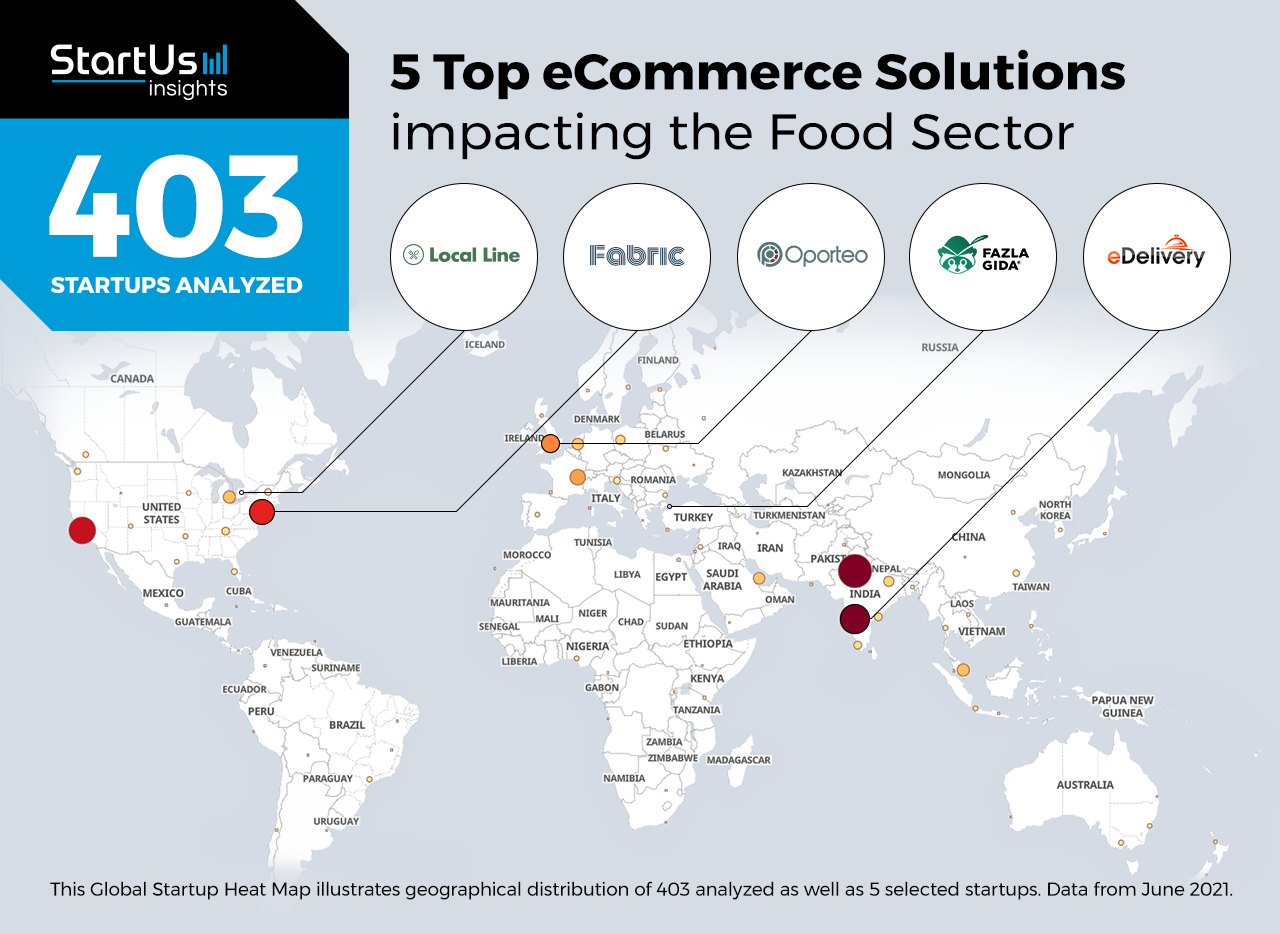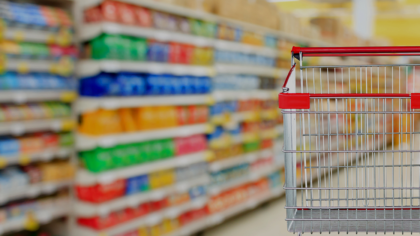Staying ahead of the technology curve means strengthening your competitive advantage. That is why we give you data-driven innovation insights into the food industry. This time, you get to discover 5 hand-picked startups developing eCommerce solutions.
Global Startup Heat Map highlights 5 Top eCommerce Solutions out of 403
The insights of this data-driven analysis are derived from the Big Data & Artificial Intelligence-powered StartUs Insights Discovery Platform, covering 2.093.000+ startups & scaleups globally. The platform gives you an exhaustive overview of emerging technologies & relevant startups within a specific field in just a few clicks.
The Global Startup Heat Map below reveals the distribution of the 403 exemplary startups & scaleups we analyzed for this research. Further, it highlights 5 food startups that we hand-picked based on criteria such as founding year, location, funding raised, and more. You get to explore the solutions of these 5 startups & scaleups in this report. For insights on the other 398 eCommerce solutions, get in touch.
Spectra Solutions builds Open-Source Food Delivery Systems
Online food delivery is an integral part of food eCommerce and the COVID-19 pandemic is further advancing investments in delivery services. Accelerated by the pandemic, the food & beverage industry is also shifting to a setup that promotes takeaway culture, thereby ensuring contactless transactions for their customers. Therefore, startups develop solutions that allow food brands to readily integrate food ordering systems with their enterprise resource planning (ERP) systems. This way, food providers are able to save time in training the staff as well as organize food delivery services swiftly.
Indian startup Spectra Solutions develops eDeliveryApp, an end-to-end food delivery system for restaurants and grocery stores such as customer-facing websites and smartphone apps. The admin panel for restaurant managers includes delivery and vendor applications to manage orders in real-time. Thereby the startup’s solution integrates food ordering management systems using a mobile-first approach, ensuring a seamless experience for customers. Additionally, the eDeliveryApp features social media integration and automated customer database generation, thereby enabling effective marketing campaigns.
Fabric provides Robotic Micro-Fulfillment for Groceries
Shelf-life and spoilage are significant factors that affect online food businesses. Well-planned warehouses and delivery systems along with demand forecasting ability are required to avoid wastage losses. This is where micro-fulfillment and local inventory centers support online food companies. Such solutions reduce last-mile delivery costs, easy deployment, and re-use of existing store footprints, thereby cutting down capital and operational expenses. That is why startups offer warehousing solutions tailored for perishables and other food items.
Based in the US, Fabric is a startup that delivers online grocery purchases through robotic micro-fulfillment centers. Fabric’s AI-powered robots group the purchased items at the fulfillment centers, where they are then packed and made ready for pick up within 10 minutes. Fabric’s automated micro-fulfillment system speeds up eCommerce operations and allows delivery businesses to focus on last-mile delivery. Additionally, the startup develops an end-to-end eCommerce solution that enables same-day delivery with local inventory centers.
Oporteo develops an Omnichannel Platform for Food Businesses
Omnichannel distribution allows food brands to reach their customers through multiple channels as well as improve their purchase experience and brand interaction. To this end, startups develop online platforms and management tools to streamline product distribution for food businesses. Moreover, eCommerce opens a digital touchpoint, thereby enabling better brand availability and improving sales.
Oporteo is a British startup that offers an omnichannel platform with business-to-business (B2B) and direct-to-consumer (D2C) capabilities for the food and drink industry. The startup’s platform proposes customer-specific pricing, discounts, and promotional models to improve customer retention. In addition, the platform integrates business intelligence tools that aid food companies in better understanding customer behavior. Oporteo’s food eCommerce solution also includes personalized customer service portals and comes with a headless eCommerce design.
Fazla Gida offers a Surplus Food Sharing eCommerce Platform
As more and more customers prefer online shopping over conventional brick-and-mortar stores, food companies are integrating digital solutions to reach their customers through online channels. These include social media platforms as well as websites that reach consumers directly. Further, eCommerce integrations allow food companies to attract customers with an interest in sustainability. This eco-friendly approach allows food businesses to share surplus food and eliminate inventory loss.
Fazla Gida is a Turkish startup that allows food businesses to share surplus food with other food companies, market chains, and non-governmental organizations (NGOs). The startup’s eCommerce platform reduces waste-related costs for food businesses. Importantly, the startup’s services are free of charge for its clients as long as their solution does not impact their waste-related expenses.
Local Line connects Food Hubs with Local Farmers
Food eCommerce not only opens up various channels to distribute food products but also enables food brands to utilize different food ingredient sources. For example, online networks connect local fresh food producers with grocery stores and restaurants. This way, food businesses are able to reduce hauling costs as well as reduce their carbon footprint. Startups create online marketplaces and supply chain solutions so that food brands can cost-effectively source local ingredients online.
Local Line is a Canadian startup that offers an online marketplace to connect food hubs and farmers. The startup’s storefront for food hubs allows customers to buy food items from different local producers in one place. Also, the startup’s online platform allows farmers to set custom prices based on products and customer preferences. Furthermore, the platform includes delivery and routing tools to facilitate product hauling from food producers to customers.
Discover more Food Tech Startups
Food tech startups such as the examples highlighted in this report focus on robotics, 3D food printing, alternative proteins as well as personalized nutrition. While all of these technologies play a major role in advancing the food industry, they only represent the tip of the iceberg. To explore more food technologies, simply get in touch to let us look into your areas of interest. For a more general overview, you can download our free Food Innovation Report to save your time and improve strategic decision-making.


![Food and Beverage Industry: Top 10 Technology Trends [2025 & Beyond]](https://www.startus-insights.com/wp-content/uploads/2024/11/Food-and-Beverage-Industry-Trends-SharedImg-StartUs-Insights-noresize-420x236.webp)






